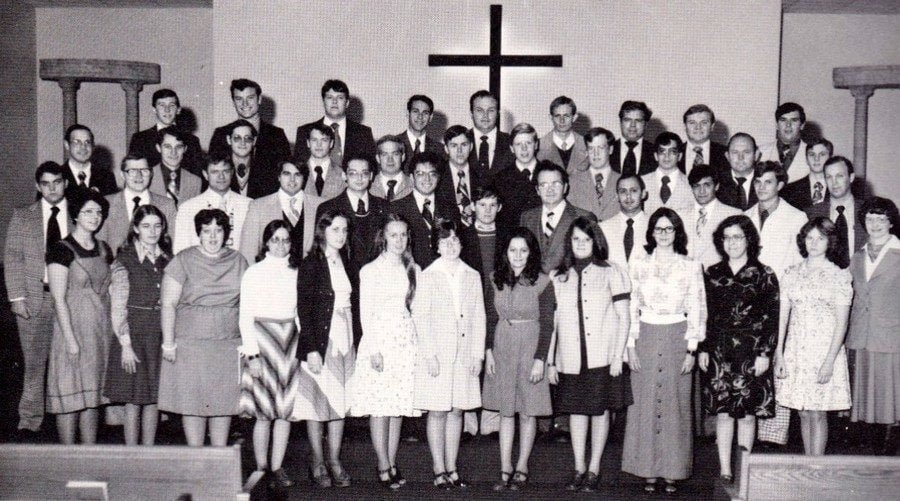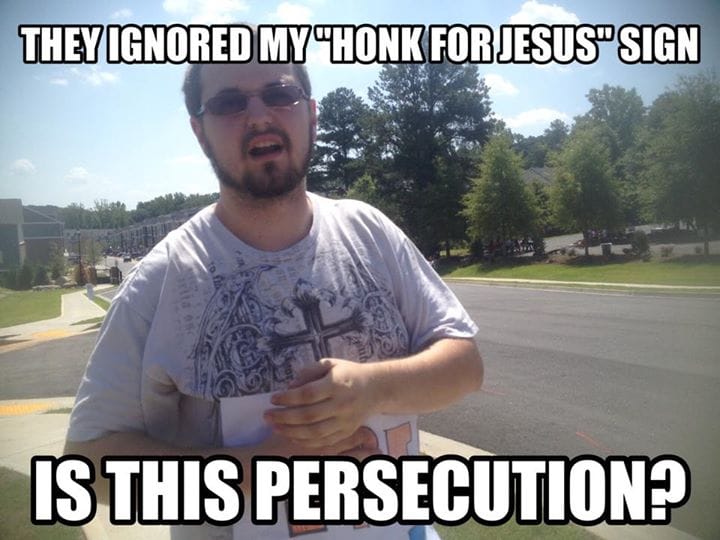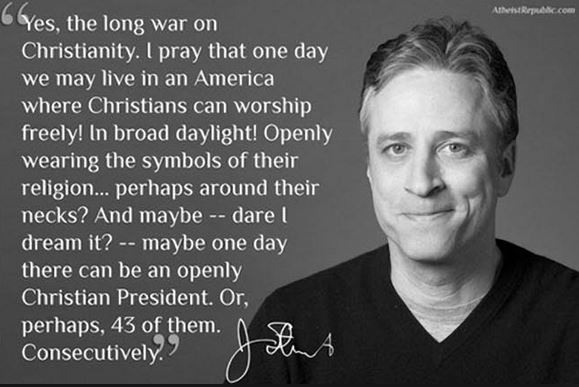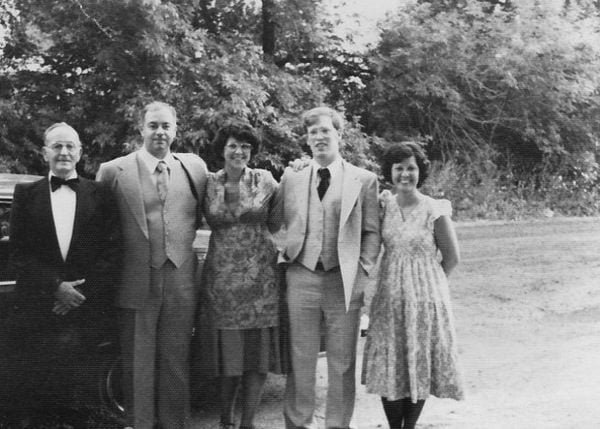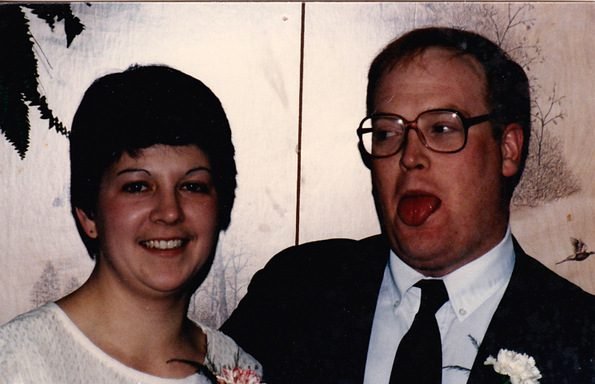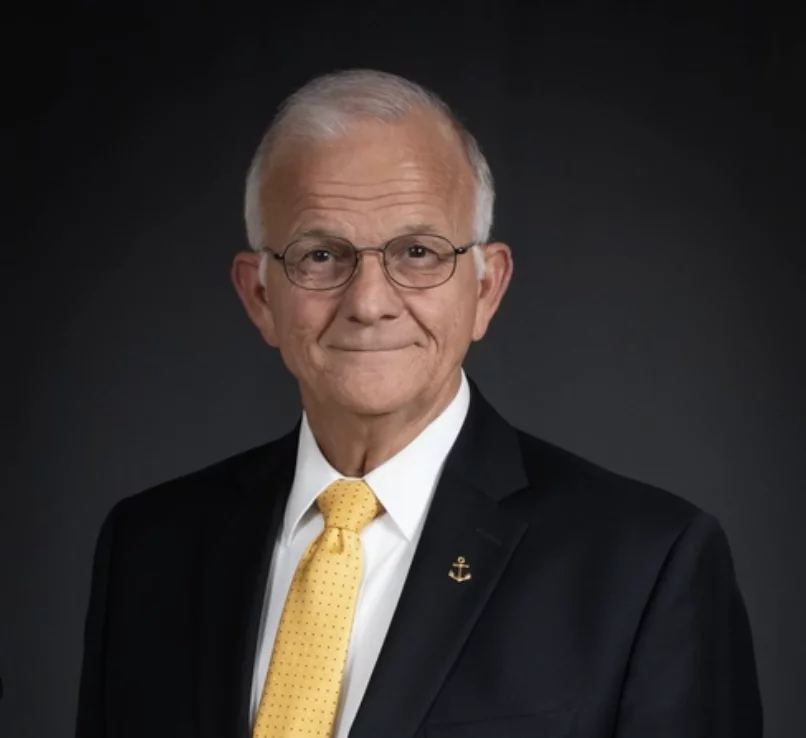
The Black Collar Crime Series relies on public news stories and publicly available information for its content. If any incorrect information is found, please contact Bruce Gerencser. Nothing in this post should be construed as an accusation of guilt. Those accused of crimes are innocent until proven guilty.
“Dr.” George Bell, founder and pastor of Anchor Baptist Church in Columbus, Ohio, was accused in 2024 of four counts of rape and two counts of gross sexual imposition involving a minor under the age of 10. Anchor Baptist is an Independent Fundamentalist Baptist (IFB) congregation.
The Columbus Dispatch reported:
A former pastor who resigned from the Columbus church he founded earlier this year has been charged with sexually assaulting a child.
George Bell, 72, of Grove City, appeared Tuesday for arraignment in Franklin County Common Pleas Court on four counts of rape and two counts of gross sexual imposition involving a minor under the age of 10. He pleaded not guilty to all charges and was released on a $20,000 recognizance bond, according to court records.
Bell was formerly the pastor at Anchor Baptist Church, located at 3699 Clime Road on the city’s Far West Side, which he founded in 1989.
Court records say the alleged assaults occurred between 2021 and June 2024. The sexual assault charges do not involve a member of Bell’s congregation, authorities said.
….
A statement on the church’s website said he resigned in front of the congregation in June, citing personal reasons.
Anchor Baptist released the following statement:
As a church, we are committed to full transparency and to the truth throughout this process. We have been and continue to fully cooperate with any law enforcement and the justice system. We invite you to join us in prayer for and support of victims, their families, and individuals involved. We continue to remain loyal to God’s Word and the principles established in Scripture. We sincerely desire your prayers for us to have Godly wisdom and clear direction as we move forward. We were previously informed by law enforcement that there was no evidence of any incident on church property or involving any church member. Recent events have verified this. Colossians 1:18 “… that in all things he might have the preeminence.”
And then released another statement:
Our former pastor, George Bell, submitted a resignation letter which was read to Anchor Baptist Church after the Thursday evening service on June 27, 2024. Pastor Bell cited personal reasons for his immediate resignation and did not go into details. To our knowledge there was nothing untoward involving church members or church property. We are grateful for his and Mrs. Bell’s years of service to Anchor Baptist Church and ask for your prayers for them during this difficult time. Isaiah 55:11 “So shall my word be that goeth forth out of my mouth: it shall not return unto me void, but it shall accomplish that which I please, and it shall prosper in the thing whereto I sent it.”
Anchor Baptist Church will continue forward for the cause of Christ. Please pray for church leadership as we seek God’s will and follow our Constitution, By-Laws, and Statement of Faith. The deacons and staff have unanimously selected Bro. Peter A. Cordrey to serve as the interim pastor. During this transition, we will maintain the same schedule and activities. We will act with integrity and transparency in this process. Colossians 1:18 “… that in all things he might have the preeminence.”
Due to new information that has come to our attention, we are amending our previous statement released on July 3. Our testimony in this community is of the utmost importance to us. We now know that there was more to the unexpected resignation of our former pastor, George Bell, than we were originally led to believe. It breaks our heart to discover that there have been serious allegations and an indictment that have been brought. Any conduct that is contrary to the Bible and our laws as citizens are unacceptable and not tolerated. In light of this new information, we endeavor to make clear our stand to our church family and to our community.
- We have been and will be cooperating fully with law enforcement and the justice system.
- We are committed to full transparency and to the truth throughout this process.
- As a church, we are loyal to God’s Word and the principles established in Scripture.
- We sincerely desire your prayers for us to have Godly wisdom and clear direction as we seek God’s help and guidance.
We get it, your pastor is a pervert and you say you didn’t know ANYTHING about his proclivities. In time, the truth shall be known — no prayers or “understanding” needed. My advice? Stop making statements and carefully consider whether the church was in any way culpable in Bell’s crimes. Quoting Bible verses rings hollow when sexual abuse against children is the crime. Readers of this site are familiar with rampant IFB cover-ups of criminal misconduct by pastors, evangelists, missionaries, youth pastors, bus drivers, music directors, choir directors, and Christian school administrators and teachers. Your commitment to “full transparency and to the truth” remains to be seen. I do hope you are true to your words.
Bell had this to say about himself on a now-deleted page on the church’s website:
I was born in the very poor and crime-ridden area of North Columbus, Ohio. Of four girls and two boys, I was the second youngest. My only brother was to play a key part in my life as a sinner and a Christian.
My parents were not close. I never heard my dad and mom exchange an “I love you” or show much affection at all. My dad never had much time for us kids, and I personally never heard my dad say to me, “I love you” or “I am proud of you” while I was growing up. My parents were not Christians and never attended church, though my mother and grandmother tried taking us to a Seventh-day Adventist church for about a year. We were not taught to pray anything more than a bedtime prayer and never read the Bible. No church people ever stopped by the Bell house to present the Gospel. No bus workers ever stopped by to see if the Bell children could go to church.
I was eleven years old. A woman I did not know was standing in our living room. My mother was there, and all of us kids were ushered into the room. The woman stranger then asked us if we wanted to live with our dad or our mom. I could not understand what was really going on, but I heard the others say, “Mom,” so I did, too. Not long after, my mom and dad were divorced after twenty-one years of marriage. As I grew older, it did not surprise me as to the reason why: my dad was a drunkard, a womanizer, and abusive to my mom and us kids.
That event seemed to open the floodgates of tragedy. The family continued to fall apart. For the first time in twenty-one years my mother had to get a job. My sisters began to date, go to slumber parties, and run with other bad kids. My brother, Bill, started fighting, drinking, and gambling. He was good at it, and I emulated him. By age thirteen I was already smoking, drinking, and running the streets. After having several altercations with the police, my mother thought it would be best to leave the small suburb where we lived and move to the west side of Columbus.
….
I was seventeen-and-a-half years old. In September of 1969, I volunteered for the Army. Because I was very physically fit and tough, I liked basic training. In A. I. T. (advanced individual training) at Fort Leonard Wood, Missouri, I met my first airborne sergeant. As a result of our meeting, I determined I wanted to be an Airborne Ranger. From a worldly viewpoint, I thought I was finally on track at the age of eighteen. I found something I was good at that those around me appreciated me doing. Like any other teenager, I was starving for attention, and if being a “gung-ho” soldier would do it, then why not?
After airborne training, while waiting to get on a list for Green Beret (the next step before getting into Ranger school), I again fell in with the wrong crowd. I was living in Fort Bragg, North Carolina. I was eighteen with no dad to call for answers, no paster with whom to get counsel, and no Christian friends upon whom to rely. With my security level and self-confidence basically non-existent, it was easy to follow a strong voice of any kind. The wrong crowd began to convince me that the government and military were all against me and giving my best to them was a joke. They taught me to rebel, disobey, make fun of authority and look for an opportunity to get out of the Army. They introduced me to illicit drugs. I had smoked cigarettes since I was eleven and drank since I was thirteen, but now I encountered marijuana and LSD. The early success of my military career notwithstanding, since nothing I had ever wanted, tried or was good at last long, it was not surprise that my life continued to go down. Because of never having a Christian background and never being witnessed to of Jesus, I assumed my condition was just bad luck and that it was bound to change sooner or later. But it did not. Without going into detail, I got into deep trouble while at Fort Bragg. Once again, I came before a judge and was told that if I was found guilty, I could receive a maximum sentence of 15 to 25 years in the penitentiary.
I had nowhere to turn. Because I was in trouble, I called my brother Bill, thinking he would understand. I really did not want help; I wanted help out of trouble. On the phone he said, “I can’t help you live like that. I go to church now.” And he hung up. He had gotten saved. My idol and example changed directions on me. The person I thought would always understand and side with me had abandoned me.
At eighteen my life had added up to zero and now I was looking at prison time. Don’t ask me why people do it or where it comes from, but it seems whenever people are in real trouble in life, they somehow find themselves in a church house. While walking across a parade field on base, I noticed a small while church house situated there on a hill. I opened the door, walked inside, sat on a pew, and through tears got down on my knees and pleaded with God, “If you get me out of this mess, I will never do it again.” Of course, the prayer was nothing more than selfish plea-bargaining. I remember when I was done, I felt as lonely and as empty as I was before I knelt. Oh, had a real Baptist preacher or soul winning been there to guide this blind, hurting, and lost soul!
….
I never met a Christian while in Vietnam. No one ever talked to me of Christ, and no one spoke of church. But one day while being re-supplied in the jungle, word was spreading that a chaplain was coming out. I remember many men went over to him. He spoke to us, and though I do not remember what he spoke, he prayed for us and gave all of us a little Bible. Though I did not read it, I thought it was incredibly nice of him to do that for me. Oh, but had someone, anyone, interrupted my life! Had someone spoken up and at least shared the Gospel with this young man seemingly doomed for Hell, but “no man cared for my soul.”
Still in the Army but back in America at age nineteen, my rebellion and hatred grew for everyone and everything. Little did I know I was about to come face to face with two people, Jesus and my brother Bill, who were not afraid of me and were determined to change me.
I came back to America just before I was discharged from the Army. At that time I met a girl whose daddy preached at a small by fiery Baptist church out in the country. Her dad said that if I wanted to see her I had to come to church. I did not know that it was the same church that my brother had gotten saved in and was attending. No one knew I was coming that night. I had never been in a Baptist church before, and though it was not a fundamental Baptist church, they believed in fiery preaching and sinners getting saved by Jesus.
A young man who had recently been called to preach was preaching that night. As I sat there I was dumb-founded that he seemed to know all I had been doing, and then he was telling everyone! I honestly believe that at the age of nineteen, for the first time in my life I heard about sin, wickedness, Jesus dying, and men needing to get right. They did not teach soul winning in that church. They believed folks should be saved, but they just believed the Holy Spirit and the sinner would work it all out when they met at the altar. So at the end of the church service, with my brother pleading with me to come back in and pray, I walked out. Between that first time I attended a Baptist church and the second time I attend (which is when I got saved), I had gotten busted four grades in the military, almost killed two people in a car accident, was almost sent to prison again, and was numb to the world and everything in it.
At twenty years of age, I was discharged from the military and found myself back in Columbus. More trouble with fighting, drugs and jail had inundated my life. Now I had lost everything. I literally had no friends, no job, no money, no car, no drugs or booze and no place to live. My mother said I could move back home until everything got better. And who lived behind my mother’s house? My brother, Bill, “the preacher.” It seemed that every evening he was over at my mother’s house talking to my mom and sisters about the Bible and telling them that they should be saved. He would beg and plead with them to come to church. I would stand by the back door and ignore the whole thing, wanting nothing to do with it. But each time he left to go back home after being turned down again by the family, he would stop and invite me to go to church with him. As always, I would turn him down.
Then came April 14, 1972. That evening I was once again standing and staring out the back door of my mother’s home when once again my brother came over to invite everyone to church. Once again, they all turn him down. And as usual, on his way out, he stopped to talk to his little brother. “Would you like to go to church with me tonight?” he said. “There is no preaching, just singing.” I told him, “I don’t have a shirt.” He said, “I’ll get you one.” “Well, I don’t have any dress pants.” “Would you quit worrying about it and just go?” he pleaded. There was one statement my brother always used when trying to get me to come to Christ. He would say, as he said that night, “I know someone Who will help you if you just let Him.” Finally, I relented and said, “Okay.”
As soon as we walked into that Baptist church on that cool Saturday night, I felt unclean and dirty. I thought this was no place for a guy like me. Before the service even started, I was overwhelmed with guilt. We found our place on the fourth row to the pulpit’s right. Outwardly I tried to return the friendliness the people showed to me. People who did not even know me acted as though they cared about me. I shook their hand. I gave a nod and a “hello.” Yet as I quietly sat there, an immense struggle began inside me.
The service began. We stood and began to sing a full-throated congregational song. Unhindered tears began to run down my face. I wanted to hide my face. We sat down and I buried my face in my hands questioned and reasoned: “What’s going on?” While an average church service continued, two voices raged in my mind. One rehearsed the same old routine of promises: “Don’t give in! Remember that party? That girl is waiting. What about your friends?” The other promised nothing, it said, “Come on. It’s the right thing to do. Come on.”
There seemed to be no one else in that room but me. Like a rush it dawned on me that the old voice was lying to me. I thought, “I have no friends out there. No one wants me around anymore. What do I care what they think?” I had heard the preacher say (yes, there was preaching that night), “You who need to be saved need to pray and ask Jesus to forgive you.” I did not know what to do. He said to pray. I had never been taught to pray. I did not know how, but I made up my mind to do whatever it would take to find relief. I was broken. With my heart breaking, my lips trembling, and my cheeks dripping with tears, I turned to my brother and said, “Bill, what do I do?” He simply stepped into the aisle and pointed toward the altar.
My heart was bursting inside. I ran to the altar and in a child-like trust begged Jesus in the only words I could form, “Oh, Jesus, forgive me; forgive me; forgive me; forgive me; I’m sorry; I’m sorry; I’m sorry…” This was the simple prayer of a lonely, empty, sinful man. I knew nothing of Bible doctrine or Christianity.
….
I am now Dr. George E. Bell, pastor and founder of Anchor Baptist Church and schools in Columbus, Ohio. The church started with ten people (six of whom were my own family) in a recreation center, on July 30, 1989. Currently (2002), our average Sunday morning attendance is over 550. We run six bus routes, average 110 soul winners out each week, average 100 baptisms a month, and have over 40 Sunday school classes. We have just built a 6,000 square foot education building and have property worth well over a million dollars. Our church has led our state in baptisms for the last four years.
Bell recently pleaded guilty to rape and was sentenced to at least fifteen years in prison.
A former Columbus pastor accused of raping a juvenile pleaded guilty and was sentenced to at least 15 years in prison, according to Franklin County Court of Common Pleas documents.
George Bell was indicted last year on four counts of rape and two counts of gross sexual imposition with the alleged crimes reportedly happening between 2021 and 2024. According to the indictment, the victim was under the age of 10.
Bell pleaded guilty to two counts of rape. The other charges were dismissed.
He was sentenced to 15 to 20 years in prison and must register as a Tier III sex offender.
Bell was a pastor at Anchor Baptist Church in Columbus at the time of the incidents.
The church said in a statement last year that Bell had resigned in front of the church on June 27, 2024, citing personal reasons.
Bell founded Anchor Baptist Church in 1989 and served for almost 35 years as pastor before he resigned.
Back in my IFB days, I was a casual acquaintance of Bell. Our paths crossed at preacher’s meetings and conferences in Columbus.
Bruce Gerencser, 68, lives in rural Northwest Ohio with his wife of 47 years. He and his wife have six grown children and sixteen grandchildren. Bruce pastored Evangelical churches for twenty-five years in Ohio, Texas, and Michigan. Bruce left the ministry in 2005, and in 2008 he left Christianity. Bruce is now a humanist and an atheist.
Your comments are welcome and appreciated. All first-time comments are moderated. Please read the commenting rules before commenting.
You can email Bruce via the Contact Form.

